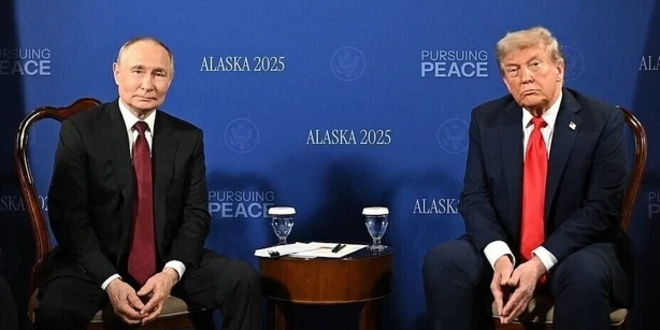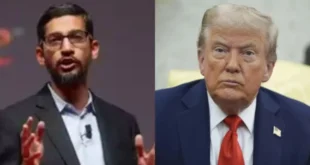Russian President Vladimir Putin scored a major diplomatic win at his Alaska summit with U.S. President Donald Trump, convincing Washington to abandon its long-standing push for a ceasefire before peace negotiations in Ukraine. The move marks a sharp policy shift that has unsettled European allies and placed new pressure on Kyiv ahead of President Volodymyr Zelensky’s upcoming visit to Washington.
Trump Signals End to “Ceasefire First” Approach
Just days after warning of new sanctions and secondary tariffs on Russia and its trade partners, Trump instead embraced Moscow’s preferred strategy. In a Truth Social post on Saturday, he wrote: “The best way to end the horrific war between Russia and Ukraine is to go directly to a Peace Agreement, which would end the war, and not a mere Ceasefire Agreement.”
Until now, U.S., European, and Ukrainian leaders had insisted that a ceasefire or at least a reduction in hostilities was necessary before meaningful talks on contested territory could begin. Russia rejected those terms in earlier discussions this year. After three hours of closed-door talks with Putin, Trump appears to have shifted U.S. policy closer to Moscow’s stance.
This change raises the stakes for Zelensky, who is set to meet Trump in Washington on Monday. Analysts expect the U.S. president to press Ukraine to consider entering peace talks without preconditions.
Europe Reaffirms Support for Kyiv
The sudden U.S. reversal contrasts sharply with Europe’s most recent position. Only last week, all 26 EU member states except Hungary backed a statement declaring that peace negotiations should take place “in the context of a ceasefire or reduction of hostilities.” The United Kingdom shares this view.
Faced with Trump’s pivot, European leaders are now emphasizing the need for robust security guarantees for Ukraine. In a joint statement on Sunday, the leaders of France, Germany, Italy, Poland, Finland, along with European Commission President Ursula von der Leyen and European Council President Antonio Costa, said:
“Ukraine must have ironclad security guarantees to effectively defend its sovereignty and territorial integrity. No limitations should be placed on Ukraine’s armed forces or on its cooperation with third countries. Russia cannot have a veto against Ukraine’s pathway to EU and NATO.”
The declaration reinforced Europe’s red lines: Ukraine decides its own territorial future, and borders cannot be redrawn by force.
Security Guarantees Back in Focus
Trump reportedly discussed with European leaders the idea of extending NATO-style protections to Ukraine, referencing Article 5—the principle that an attack on one member is an attack on all. Italian Prime Minister Giorgia Meloni floated the proposal earlier this year, though questions remain about how such guarantees could apply to a non-NATO state.
Diplomatic sources suggested Putin “supposedly agreed” in principle to this arrangement during talks with Trump. Why Russia would accept a U.S.-backed security umbrella for Ukraine remains unclear, especially given Moscow’s longstanding demand that Kyiv abandon NATO ambitions.
Nevertheless, Western officials believe strong U.S. and European commitments would help deter future Russian aggression. The debate has also revived discussion of the “Coalition of the Willing,” a Franco-British plan to deploy a peace monitoring force to Ukraine after any potential agreement.
A Turning Point in Peace Talks?
For Putin, the summit was a clear success. He avoided threatened sanctions and secured a U.S. policy adjustment that undercuts Europe’s ceasefire-first strategy. For Trump, it positions him as the leader capable of delivering what he calls a “just and lasting peace.”
For Ukraine and its allies, however, the road ahead looks far more complicated. Zelensky will arrive in Washington seeking clarity on whether the U.S. intends to push Kyiv into premature negotiations. At the same time, Europe is recalibrating, stressing that any deal must come with binding security guarantees and respect for Ukraine’s sovereignty.
As European leaders cautiously praised Trump’s efforts to “stop the killing in Ukraine,” the geopolitical balance has shifted once more. The Alaska summit has reset the terms of debate: the question is no longer whether peace talks will happen, but under whose conditions—and with what security assurances for Kyiv.
 The Daily Star Ireland
The Daily Star Ireland



